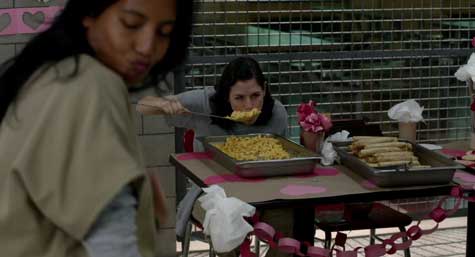
There’s a nice, tossed-off moment a few minutes into “You Also Have A Pizza” where the administrator Joe Caputo (Nick Sandow) is talking to the sweet prison guard, Susan Fischer (Lauren Lapkus) about the surveillance project she’s working on. Fischer’s job is to monitor phone calls made by prisoners. She plays him a particularly embarrassing recording and they share a laugh, but then Fischer gets serious and says, “It’s so interesting, all these lives. It’s like reading Dickens.”
A show that involves a sprawling cast of characters, each with her or his own hopes and fears, could do worse than to use the master of the novel as a guiding star. This season, in particular, has used the episodic nature of the series as a way to tell small stories within longer, more complex, plot arcs. (Lest we forget, Dickens originally published many of his works as serials that were structured to keep readers coming back.) We’ve seen the back stories of several characters this season, and for Episode 6 we get the story of Poussey Washington (Samira Wiley).
We see her as a military kid living with her family on an Army base in Germany. She has a pretty German girlfriend named Franziska (Nina Rausch), but they have to keep their relationship a secret. The show smartly situates their story within the hypocrisy of the “Don’t Ask, Don’t Tell” culture—wherein queer love and sex are forced into the shadows—without making it a cliché. After all, Poussey herself isn’t in the military and neither is Franziska. Poussey’s father, whom we expect to be a bigot (because, again, that’s the cliché), isn’t. The story manages to address same sex relationships within this military culture while tweaking the narrative we expect to see. Smart.
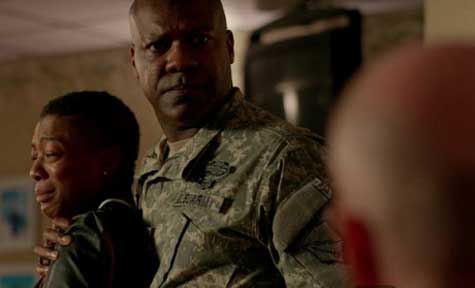
“You Also Have A Pizza” is structured around a recurring question posed to each inmate, “What is love to you?” The answers fluctuate from the comically goofy to the heartbreakingly serious. The best answer comes, of course, from Crazy Eyes—who, I suspect, could unfold the secrets of the universe to us if we would all just listen:
What is love? It’s like you become more you, which normally is like…aakkkk pow! But now, it’s okay, because they chose to take that on, all that weird stuff. Whatever is wrong or bad or hiding in you, suddenly it’s alright. You don’t feel like such a freak anymore.
Take that, Charlie Dickens.
It’s fitting that an episode about Poussey should have a larger theme about love—about what it is and how it intertwines with sex and desire. In the present day of the show, of course, her main conflict comes from her love for Taystee (Danielle Brooks). The two face a couple of obstacles. One is Taystee’s confusion about her own feelings. Unlike Poussey, she’s not gay, and yet she clearly loves Poussey and feels an attraction to her. What does this mean? Is sexual identity defined strictly by desire? One thing is for sure, desire isn’t defined strictly by sexual identity. The heart wants what the heart wants—and the same thing is true of other parts of the body. All of this becomes a real problem because of the second obstacle facing Poussey and Taystee, which is Vee’s opposition to their relationship. I’m still not convinced that Vee’s thus far successful attempts to keep the girls apart isn’t part of her overarching master plan. We’ll see.
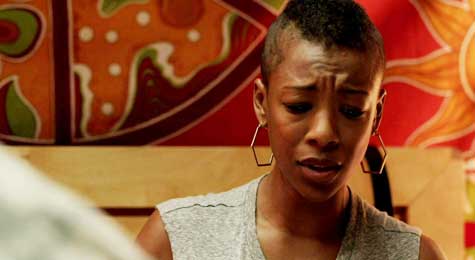
In the flashback, though, we see how sex and desire managed to keep Poussey from the woman she loved. Rendered in the longest sex scene of the series so far, we see the joy of their sexual relationship—playful, intense, passionate—but we also see it become a wedge when they’re discovered by Franziska’s bigoted father. The most painful part comes later, when Poussey rejects Franziska before she herself can be rejected. She sums up the girl in sexual terms, like a check mark on that list kept by Nichols, and denies any kind of deeper feelings. Later, unable to control herself she confronts the girl and her father and declares her love. (This last scene actually seems superfluous to me. The real damage is done in the earlier scene.) Is all of this a foreshadowing of what is coming for Poussey and Taystee? We’ll see.
One last point on the Poussey storyline: I like that we don’t see how or why she wound up in prison. Giving each character a dedicated back story episode runs the risk of shutting more doors than it opens. Once we know why someone is inside, it has the effect of closing the book on that part of their life. With Poussey, we still have things to learn—which is great since it gives the luminous Samira Wiley even more room to shine.
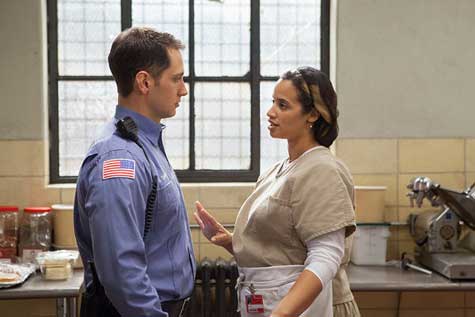
The episode explores other love affairs (and love non-affairs) from Caputo’s unrequited crush on Fischer to the prison house Romeo and Juliet relationship between nice-guy guard Bennett and nice-girl inmate Diaz. (Is it just me or do those crazy kinds make you nervous? Is this going to end horribly?) We get a sweet scene between Flaca and Maritza, who share a kiss that presents another variation on the episode’s themes—their kiss being not about sexual desire so much as about the desire for desire, the need to feel something. And we get a scene between Morello and Crazy Eyes that seems to close the door on one story and open the door to another.
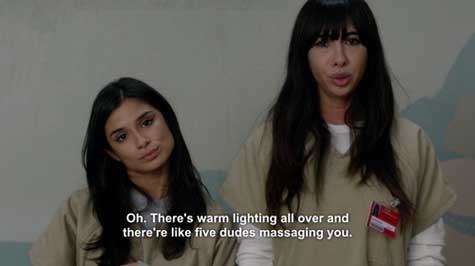
We also get a scene with Larry kissing Polly, because…well, I don’t know why. Because Larry doesn’t want to be “a moon.” Whatever the hell that means.
Jake Hinkson, The Night Editor, is the author of The Posthumous Man and Saint Homicide.
Read all posts by Jake Hinkson for Criminal Element.

He doesn’t want to be a moon. The moon doesn’t have its own light, it just reflects the light of the sun. Larry wants to be the sun, and not just reflect the light from Piper.
Larry will never be a sun. He’s a moon. I know a moon when I see one. And Larry’s a moon.
Since Poussey is my favorite character, I felt it was time to join the conversation. I love the way Orange Is the New Black is following in LOST’s footsteps and dedicating each episode to a specific character’s backstory. And I must agree, Larry is a moon. But that’s all the thinking about Larry that I want to do.